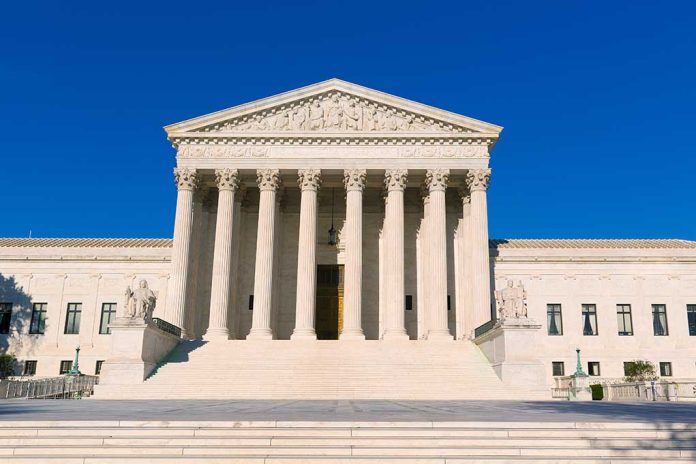
Supreme Court justices appear poised to support energy companies’ right to challenge California’s strict vehicle emission standards, potentially reshaping state-federal climate policy dynamics across the nation.
Key Takeaways
- The Supreme Court is considering whether to revive a lawsuit by Diamond Alternative Energy and other energy companies against California’s stringent vehicle emissions standards
- Justices seemed skeptical of the lower court’s ruling that dismissed the case on standing grounds, suggesting energy companies may have legitimate claims of economic harm
- Energy companies argue California is effectively acting as a “quasi-federal regulator” on climate policy, raising constitutional concerns
- California has set a goal for 100% electric vehicles by 2036, which energy companies claim threatens their business model
- A ruling in favor of the energy companies could significantly impact states’ ability to set independent environmental regulations
Energy Companies Challenge California’s Emissions Authority
The U.S. Supreme Court is currently weighing whether to revive a lawsuit brought by Diamond Alternative Energy LLC, a subsidiary of Valero Energy Corp., along with American Fuel and Petrochemical Manufacturers and other industry groups against California’s vehicle emissions standards. The case, formally known as Diamond Alternative Energy LLC v. Environmental Protection Agency (EPA), challenges California’s unique authority to set emissions standards stricter than federal requirements. During oral arguments, several justices appeared sympathetic to the energy companies’ claims that they have standing to sue, questioning the lower court’s dismissal of the case.
The U.S. Court of Appeals for the District of Columbia Circuit previously ruled that California could regulate tailpipe emissions and dismissed the energy companies’ lawsuit on the grounds that they lacked standing. However, in Tuesday’s hearing, both conservative and liberal justices questioned this reasoning, suggesting the energy companies may indeed have valid claims of injury that deserve consideration. The companies argue that California’s regulations effectively force a transition to electric vehicles, directly harming their business interests.
The U.S. Supreme Court has agreed to review a critical case that could determine whether oil companies have the standing to challenge California's clean-car standards. https://t.co/BUW2WwMEIK#ClimateChange #CleanAir #ElectricVehicles #California #ShipandShoreEnvironmental
— Ship & Shore Environmental (@ShipnShoreEnv) January 17, 2025
Constitutional Questions and Economic Impact
At the heart of the case is the Clean Air Act provision that allows California, and only California, to request waivers from the EPA to set its own vehicle emissions standards. This special status dates back to the 1970s when California was battling severe air pollution. The petitioners contend this arrangement has evolved beyond its original purpose, with California now effectively dictating national climate policy. They argue this creates constitutional concerns about one state having disproportionate regulatory power over interstate commerce.
California has set an ambitious goal of transitioning to 100% electric vehicles by 2036, a move supported by the EPA and National Highway Traffic Safety Administration under the previous administration. The energy companies argue this accelerated timeline for phasing out internal combustion engines would substantially reduce demand for their products, causing significant economic harm. They further contend that other states frequently adopt California’s standards, amplifying the impact beyond state lines.
Shifting Regulatory Landscape Under President Trump
With President Trump now in office in 2025, the case takes on added significance as his administration has signaled a desire to roll back emissions regulations and promote American energy independence. The EPA’s position on California’s waivers could shift dramatically compared to the previous administration, which had granted the waivers allowing California’s stricter standards. Should the Supreme Court rule in favor of the energy companies, it would align with the current administration’s energy policy priorities and potentially limit states’ abilities to establish independent climate regulations.
California officials defend their regulatory independence, emphasizing that Congress has historically recognized the state’s unique air quality challenges and explicitly authorized its separate standards. They argue that removing this authority would undermine decades of environmental progress and hamper efforts to address climate change. State representatives maintain that their emissions standards are necessary to protect public health and meet climate goals, regardless of federal policy shifts.
Potential Far-Reaching Implications
Legal experts watching the case note that a decision in favor of the energy companies could have far-reaching implications beyond just vehicle emissions. It could potentially limit states’ abilities to enact climate policies that are more aggressive than federal standards across various sectors. The focus on standing – whether the plaintiffs have suffered actual harm that warrants legal remedy – is particularly significant as it determines access to judicial review of administrative actions.
The Supreme Court’s decision, expected by the end of June, will likely influence not only environmental regulation but also the broader relationship between federal agencies, states, and businesses in addressing climate change. As justices appeared skeptical of the lower court’s dismissal, many observers expect the case to be sent back to the appeals court for further consideration on the merits. This would give energy companies another opportunity to challenge California’s emissions authority just as President Trump’s administration works to reshape America’s energy and environmental policies.
Sources:
- Justices Hear Case on California’s Auto Emissions Standards | C-SPAN.org
- Supreme Court Seems Inclined to Let Energy Companies Sue California Over Emissions Rules | The Epoch Times














